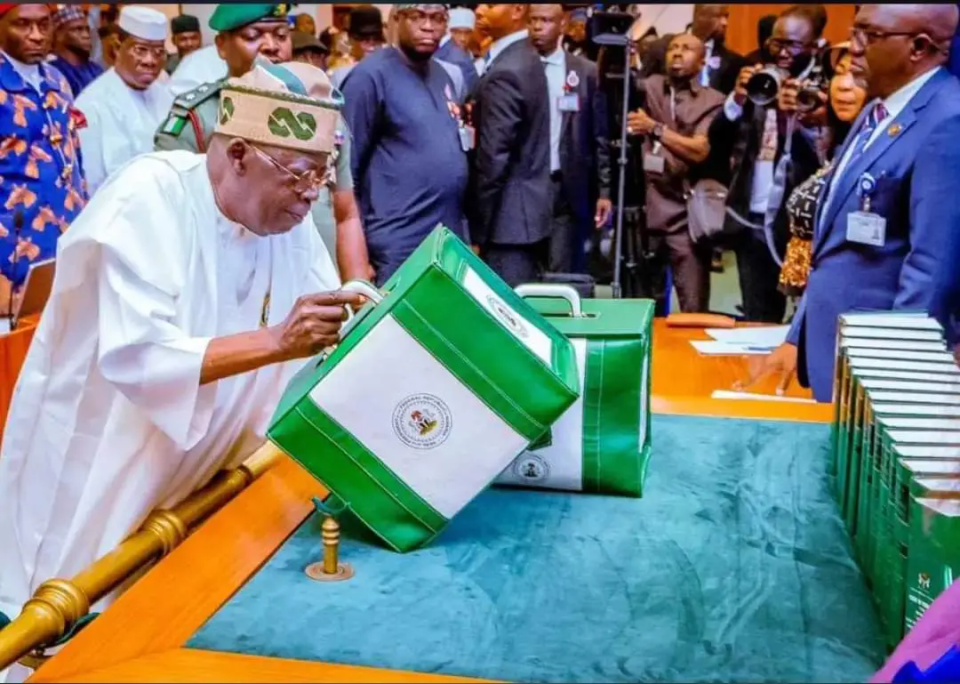By Isaac Atunlute
Every year, Nigerians are presented with a voluminous federal budget–pages filled with figures, projections, and promises. But for the average citizen navigating potholed roads, overcrowded hospitals, and dilapidated schools, a common question persists: where does all the money go?
In 2024, the Nigerian government unveiled a ₦27.5 trillion budget tagged the “Budget of Renewed Hope.” It projected revenues of ₦18.32 trillion, leaving a deficit of ₦9.18 trillion.
Remarkably, ₦8.25 trillion–nearly a third of the total budget–was earmarked for debt servicing alone. What this means is that before a naira is spent on roads, schools, and hospitals, trillions are already committed to paying interest on loans.
A breakdown of sectoral allocations reveals that defence and security received ₦3.25 trillion (approximately 12%), education ₦2.18 trillion (7.9%), health ₦1.33 trillion (5%), and infrastructure ₦1.32 trillion (4.8%).
While these figures may appear significant, they fall short of global standards. For example, in 2001, member states of the African Union signed the Abuja Declaration, committing to allocate at least 15% of their national budgets to health. Nigeria’s allocation is only a third of that benchmark.
In 2025, the federal government approved a record-breaking ₦54.99 trillion budget–a significant jump from the initial ₦49.74 trillion proposal and nearly double the previous year’s ₦27.5 trillion.
The 2025 budget projects revenue of ₦41.81 trillion and a deficit of ₦13.08 trillion, to be financed through borrowing, asset sales, and partnerships.
Debt servicing remains high at ₦8.25 trillion. Notable allocations include ₦4.91 trillion for national defence and security, ₦3.52 trillion for education, ₦2.48 trillion for health, and ₦4.06 trillion for infrastructure.
However, concerns over transparency allegations continue to cast a shadow over the budgeting process. In 2025, civil society organization BudgIT accused lawmakers of adding over 11,000 projects worth ₦6.93 trillion to the budget without clear justifications—a practice known as budget padding.
Such insertions divert resources from critical sectors and erode public trust in the budget’s credibility.
Economic analyst Esther Ajayi highlights deeper structural problems: “We have a budget that prioritises consumption over development. When over a third of our funds go to debt servicing and recurrent expenditure, it leaves little room for real investment in infrastructure, education, or healthcare. Without rebalancing our priorities, we’re just recycling poverty with every fiscal year.”
She also warns that the current system is unsustainable, especially as inflation and the naira devaluation steadily erode the real value of allocated funds.
Ultimately, Nigerian budget allocations remain more aspirational than transformational–detailed on paper but detached from the realities of everyday citizens.
The Nigerian government's federal budget for 2024 and 2025 highlights several fiscal challenges and transparency issues. In 2024, a budget of ₦27.5 trillion was introduced with a deficit of ₦9.18 trillion, where a significant portion (₦8.25 trillion) was allocated for debt servicing. Key allocations included defence and security (₦3.25 trillion), education (₦2.18 trillion), health (₦1.33 trillion), and infrastructure (₦1.32 trillion), yet these figures fall short of international standards, particularly in health funding as per the Abuja Declaration commitments.
In 2025, the budget significantly increased to ₦54.99 trillion, projecting revenue of ₦41.81 trillion with a ₦13.08 trillion deficit. The budget faced criticism for alleged 'budget padding,' as civil society pointed out the introduction of over 11,000 projects worth ₦6.93 trillion without clear justification. Economic analysts criticize the budget's focus on debt servicing and recurrent expenditure over development, warning that such a focus undermines sustainable growth and real investment in essential sectors like infrastructure, education, and healthcare. As inflation and currency devaluation exacerbate these challenges, the budget remains largely aspirational rather than resulting in practical improvements for Nigerian citizens.






